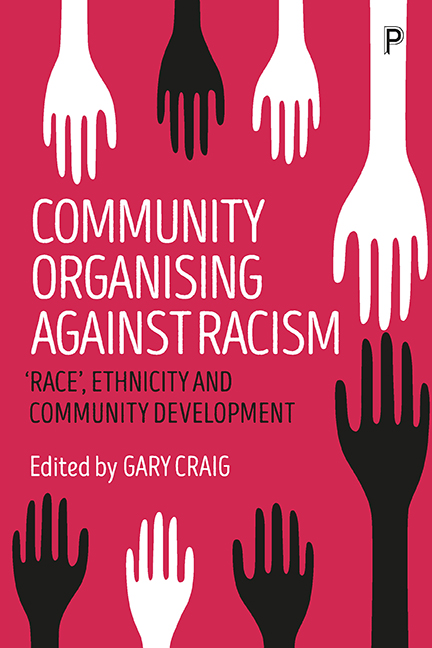Book contents
- Frontmatter
- Dedication
- Contents
- List of figures
- Author biographies
- List of abbreviations
- Introduction
- Section One Community development with ethnic minorities: history, theory, policy
- Section Two Building capacity with BME groups
- Section Three Working with Roma communities
- Section Four Global experience
- Section Five Working across cultural boundaries: ideological and personal reflections
- Afterword: Messages for community development in working with minority groups
- Index
Eight - Participatory action research with refugee and asylum-seeking women
Published online by Cambridge University Press: 12 April 2022
- Frontmatter
- Dedication
- Contents
- List of figures
- Author biographies
- List of abbreviations
- Introduction
- Section One Community development with ethnic minorities: history, theory, policy
- Section Two Building capacity with BME groups
- Section Three Working with Roma communities
- Section Four Global experience
- Section Five Working across cultural boundaries: ideological and personal reflections
- Afterword: Messages for community development in working with minority groups
- Index
Summary
Introduction
This chapter discusses the methods, processes and outcomes of a Comic Relief-funded three-year community development and advocacy programme undertaken with Refugee and Asylum-Seeking Women (RASW) in London. It focuses on how the use of participatory action research and training delivered by RASW can challenge and inform the way in which ‘professionals’ deliver health and legal services to vulnerable communities. The project, undertaken during 2012–15 by Independent Academic Research Services (IARS), a London-based charity, was co-designed with participant beneficiaries with the explicit aim of generating institutional change and increased gender sensitivity in the treatment of RASW, both through harnessing research findings to drive policy and practice change and by allowing women themselves to articulate the problems they currently face in terms of accessing appropriate support.
IARS (now renamed as the IARS International Institute) specialises in utilising community development methods in its work with young people at risk of exclusion, and other vulnerable groups, aiming to bring about policy change while enhancing participants’ knowledge and skills base. The three-year RASW project (entitled Abused No More) was carried out in partnership with Buckinghamshire New University/Institute for Diversity Research, Inclusivity, Communities and Society (IDRICS).
The context to the Abused No More project
Prior to examining the community development processes used within this project and the findings and practice-focused outcomes and recommendations, we commence with a short discussion on existing legislation, literature and research relevant to this work. These materials demonstrate that while legal advice and health services available to refugees and asylum seekers are typically regarded as gender blind and politically neutral, and thus perceived of as adding to the ‘public good’, in practice, underlying presumptions and common professional models of engagement can increase harm to women who are already vulnerable, hence creating a cycle of re-victimisation (Singh, 2010; Tate, 2015).
The UK asylum system (operationalised by the UK Border Agency [UKBA]) is governed by a complex mixture of international law (that is, United Nations Conventions and Protocols, and European rulings and guidance) as well as individual legislative enactments by states that are signatories to the United Nations 1951 Convention relating to the Status of Refugees.
- Type
- Chapter
- Information
- Community Organising against Racism'Race', Ethnicity and Community Development, pp. 137 - 154Publisher: Bristol University PressPrint publication year: 2017

